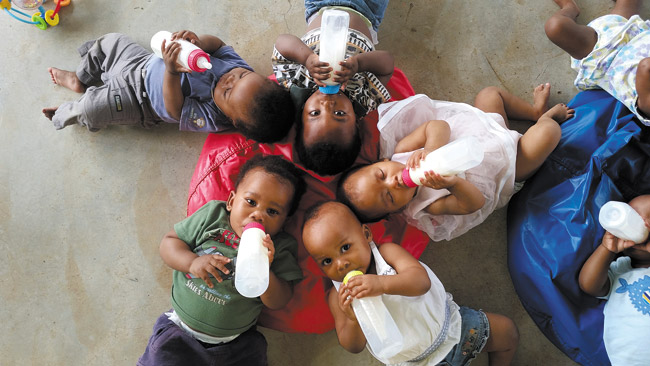The Effects Of AIDS On Swazi Children
“This country will be HIV/AIDS free by 2022,” declared the King of Swaziland in his “State of the Kingdom” address last month. This small southern Africa nation about the size of New Jersey has held the inglorious title of being the No. 1 AIDS-infected country in the world for more than 10 years now (estimated 44 percent).
It is high time for King Mswati III, Africa’s only all-powerful monarch, to take a wholehearted stab at the disease that’s wiped out a generation, left his country with more than half the population vulnerable children and orphans, and the world’s poverty experts scratching their heads. Reports of his lavish lifestyle have not endeared him to the global community.
This was my eighth visit to Swaziland in 10 years, my third in a year. Getting there requires a round-trip journey of 52 flight hours, 10 driving hours and endless airport wanderings. When Swazis ask me where I’m from, I just say the U.S., as “Hawaii” elicits a blank stare.
Heart for Africa’s Project Canaan farm and children’s home, the humanitarian organization for which I volunteer, stands at the intersection of poverty, cultural practices, HIV/AIDS and insulated leadership. It takes in abandoned babies, helps starving widows and children, helps revive a dying population, and hires some of Swaziland’s 70 percent unemployed, vowing to make an impact in the areas of hunger, orphans, poverty and education.
Like eliminating AIDS, “self-sustainability,” an almost-cliché term the world’s judges of nonprofit success use when it comes to poverty initiatives, is deemed the impossible dream. The Bill and Melinda Gates Foundation, helped by Warren Buffett’s hefty billions, is a key player in a global push for the poor to realize self-sufficiency through agriculture. But potholes of history mar their idealistic path.
So can Heart for Africa fit into a self-sustainability model?
In 2009, when Heart for Africa purchased Project Canaan — 2,500 acres of undeveloped private land in Swaziland — a 10-year plan for self-sustainability by 2020 was built around it. (Don’t scoff.) Now, halfway into the plan, the sheer magnitude of progress toward the goal is stunning.
While I was there last week, our team got to welcome tiny 3-day-old George to the El Roi baby home, bringing the count of orphans under the age of 4 at Project Canaan to 89 (in three years’ time). The babies’ 120 bottles daily and the toddlers’ 20 gallons of milk weekly are derived solely from the farm’s dairy, which also exports to a local distributor. Even its cheese and yogurt (which the children eat) is sold to a leading grocery store.
In only five years, the farm has cleared much land and built 16 buildings, with construction ongoing, to include a church, baby home, toddler home, pre-school, kindergarten, medical clinic, artisan training center for jewelry and holiday ornament making, a dormitory (one of four planned), large dining and recreation hall for the children, a storage and distribution facility for donated items, a mechanics shop, and a shop for wood-working and vocational training. Farming, construction, child care and jewelry production employs more than 240 from the local community, which impacts the lives of more than 12 other Swazis per employee. The fields, now installed with 93 miles of drip tape, grow vegetables that the babies eat and are also imported to Europe. Three dams ensure water for irrigation and drinking.
And did I mention the goat farm for meat sales, the beehives for honey production, a chicken/egg farm, and plans to grow hydroponic strawberries for export to South Africa?
Self-reliance also includes charity within a charity. Project Canaan distributes 74,000 hot meals monthly to vulnerable Swazi children through 27 partner churches.
Still, all this admirable self-sufficiency begs a question: Will donor help still be needed? Yes, to arrive at being able to absorb all the day-to-day needs of the 260-projected children by 2020, money must be raised.
Also, if history remains the teacher, until leaders make their lofty vows reality, babies will continue to be discarded, women will still struggle, disease will flourish and jobs will remain elusive.
Kings and presidents might do well to hire Ian and Janine Maxwell, Heart for Africa’s leadership, to advise on becoming self-sustainable.
(Maybe even the U.S., with our $18 trillion indebtedness?)
For more information, go to heartforafrica.org.
susanpagecoffee@gmail.com






